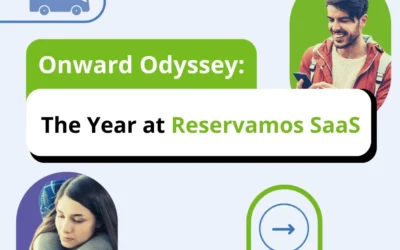A 3 million dollar opportunity for the LatAm bus sector
We had a conversation with Rodrigo Cobo, Executive Director at Talaria, a travel industry expert, and Reservamos Advisor. We discussed various aspects of the ancillary strategy, including its evolution, value, implementation, necessary factors, and new trends for the bus sector.
Based on this discussion, we have compiled a list of 12 essential points for the bus sector:
- Ancillary refers to the ability to “unbundle” a product or service, which can help segment customers and understand their needs better. It is not just a tool for increasing revenue, but it can also help improve customer experience.
- Assuming what travelers want is a big mistake that can lead to a company’s downfall. Many companies have gone bankrupt due to such assumptions.
- Technology played a significant role in the adoption of the ancillary strategy in the 1990s.
- “Families tariffs” were created in the late 2000s as a middle ground to meet travelers’ expectations and avoid overloading the service portfolio.
- Giving customers the power of choice is the most significant benefit of the ancillary strategy. Companies need to understand their customers deeply, segment them, and increase their revenue.
- For companies that are new to the ancillary strategy, it is recommended to start with an eCommerce model before moving on to ancillary merchandising.
- Both low-cost and premium models can have an ancillary strategy, and it is unnecessary to have a low-cost model to increase revenue.
- The first and last mile of a bus journey is crucial, and it’s advisable to outsource this service.
- Interlining is a pioneering technology that can be used to form alliances and shared codes, which can be beneficial for the sector.
- Dynamic pricing is the starting point of any ancillary strategy as it increases the company’s competitiveness and reaches.
- The future of the ancillary strategy is 1-to-1 personalization or à la carte services.
- The ancillary strategy must increase the average value of the transaction. The unbundling strategy must lower ticket costs to allow customers to add extras.
Regarding the industry’s recovery, Rodrigo Cobo is optimistic, especially about domestic travel by bus. He recommends segmenting travelers using customized ancillary strategies, working with experts and technology providers like Reservamos SaaS, and keeping up with industry blogs like Reservamos SaaS and WTTC for ground transportation trends.
About Rodrigo Cobo:
Rodrigo has over 15 years of experience in the tourism and transport sectors. He is the Executive Director of Talaria Marketing, a marketing consultancy agency for companies and tourist destinations.
He started his career at Aeroméxico as the Director of Marketing and Club Premier. He then worked at SABRE as the Director of Marketing, Public Relations, and Business Development, and at Travelocity as the Vice President for Mexico and Latam.
Rodrigo is a recognized entrepreneur, mentor, and philanthropist. He is part of the global organization Endeavor and volunteers for several projects that have an impact on economies in development.




